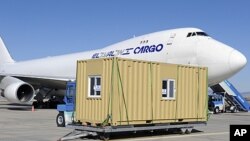Israel was one of the first countries to answer Turkey's appeal for help after last week's deadly earthquake. It was an important gesture, as relations between the formerly close allies had hit rock bottom recently. Business between the two countries, however, has continued to boom. Dorian Jones reports from Istanbul.
Turkey downplayed Israel's offer of post-quake assistance, saying Israel was just one of many nations providing aid to the country's battered southeast. Both sides have dismissed any hope of an early thaw in their icy diplomatic relationship.
But that has not affected the booming trade between the countries, according to chief economist Emre Yigit, who works for the Turkish financial trading house Global Securities.
"Overall it appears Turko-Israel trade relations have not suffered in the slightest," said Yigit.
The ongoing political fight saw Ankara expelling senior Israeli diplomats earlier this year. But the trade attaches were allowed to remain. Israel's trade attache in Istanbul, Joe Abraham, says business people have different perspectives than politicians.
"Business is a long-term effort, so it does not surprise me," said Abraham. "Companies and people when they do business, they do business because it is [a] win-win solution. It's business people [who] are willing to do business because they need each other. Because trade between Israel and Turkey is quite complimentary."
Israel exports chemicals, agriculture products and high-tech manufacturing machinery to Turkey, while Turkey exports textiles and transport equipment to Israel.
The economy in both countries is growing, and they are a good match. According to Menashe Carmon, president of the Israel-Turkey Business Council, bilateral trade increased 35 percent last year. He said the figure could have been even higher without the current diplomatic tensions.
"Joint ventures, or new investments, or partnerships between the new markets, especially for new-comers, are not developed as expected," said Menashe. "Because the environment is not as favorable for that, so people wait, and don't invest in a market, which is not clear."
Maintaining bilateral trade is important. Turkey is now Israel's sixth most important trading partner. Fears that the current diplomatic spat could spill over into the economic sector prompted Israel's central bank chief, Stanley Fisher, to warn of the economic consequences of such an event. Political scientist Soli Ozel says despite the fiery rhetoric from the Turkish prime minister toward Israel, pragmatism rules the day.
"Trade embargo? I doubt it, because the trade volume is almost $3 billion between the two countries," said Ozel.
Turkey's western allies, in particular Washington, are concerned about the ongoing diplomatic tensions. But the booming trade is seen as an important sign that however bitter the dispute is, it still remains under control. Israeli trade attaché Abraham says the healthy trade ties could offer hope of a rapprochement.
"I hope this will serve as [a] bridge in the future for even better trade relations and not only trade, maybe even in other areas," Abraham added.
Few observers expect a warming of relations anytime soon. But there is a commonly held belief that countries that trade with one another seldom go to war.
Turkey-Israel Trade Unaffected by Diplomatic Spats
- By Dorian Jones




